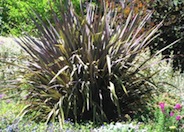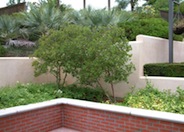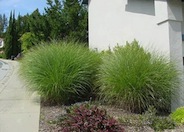
Common name:Tree Roses
Botanical name:Rosa Tree varieties
Tree roses are actually shrubs that have been grafted or grown in a way that looks like a tree, ie with a trunk. Tree roses can be floribundas, hybrid teas, or grandifloras. They are typically used as specimen plants. Make sure the plant is tied to a stake in case of strong winds.

Common name:New Zealand Flax, Purple
Botanical name:Phormium tenax 'Atropurpureum'
Phormium tenax 'Atropurpureum' is an evergreen perennial. Big, dramatic plant composed of many swordlike, stiffly vertical leaves can reach 5' tall. Leaves are purple red. Flowers stems reach high above leaves, bearing clusters of 1"-2" blossoms in dark red.

Common name:Strawberry Guava
Botanical name:Psidium cattleianum
This shrub will reach 12' tall and has medium sized, glossy green leaves with white flowers that bloom in the summer.

Common name:Snow-In-Summer
Botanical name:Cerastium tomentosum
Masses of snow white flowers highlight this plant during the early summer season.

Common name:Eulalia or Japanese Silver Grass
Botanical name:Miscanthus sinensis
Miscanthus sinensis is popular ornamental grass. Flowers are held well above foliage clumps and may be cut for fresh or dry arrangements.

Common name:Dymondia, Rock Ditty
Botanical name:Dymondia margaretae
This foliage is gray/green/silvery; it is a very dense, mat forming groundcover. It tolerates drought, cold, salt spray and poor soils. It's deep rooted and produces small, inconspicuous yellow flowers. Rock Ditty is great for use in between stepping stones or pavers.

Common name:Goodwin Creek Grey Lavender
Botanical name:Lavandula 'Goodwin Creek Grey'
Lavandula 'Goodwin Creek Gray' is an evergreen shrub. This dense foliaged plant grows to 2.5'-3' high and 3'-4' wide, with silvery leaves that are toothed at the tips. Deep violet-blue flowers bloom from spring to late fall.

Common name:Blackwood Acacia, Black Acacia
Botanical name:Acacia melanoxylon
Blackwood Acacia is a fast growing tree reaching 30'-50' with 20'-30' spread. It has white flowers that are noticeable from March through May. It can work as a windbreak and has wonderful biomass value. Its leaves are dark green and narrow, with flowers that can be creamy to straw-colored, growing in short clusters and appearing in March or April.
| Designer: | Lavender and Companions |
Photographer: GardenSoft |
Soils and Compost:
Incorporate compost 6" into your soil to retain water, reduce compaction, feed earthworms, and provide valuable nutrients to your plants.
Water Saving Tip:
Adjust sprinklers to avoid watering sidewalks and driveways.
Integrated Pest Management:
Attract, or buy beneficial insects such as ladybugs and lacewings to control pest outbreaks in your garden.
